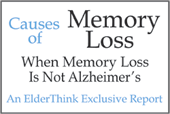
10 Signs of Alzheimer's
Forgetting That Is Not Normal
Gretchen Heuring for ElderThink
We all forget things, our grocery list, people's names at the moment of introduction, or why we walked into a room. Of course we remember later and slap our heads. This type of forgetting is probably due to just plain having too many other things to think about. This is normal forgetting. It's not Alzheimer's.
Alzheimer's Association Names 10 Signs
The Alzheimer's Association has defined ten tell-tale signs of this terrible disease. Before we begin the list, it's important to understand that Alzheimer's is fatal. It is a slow decline that results in being unable to care for ourselves and we die from it.
Alzheimer's can be emotionally overwhelming for our loved ones and, because the progression takes so long, the disease can absorb all available financial resources, leaving our spouse and family with very little.
The disease presents itself differently in different people but these ten signs provide a good handle on what might be wrong.
#1 Memory Loss That Disrupts Daily Life
This means forgetting recently learned information and not remembering it later; asking the same question over and over; and needing help with ordinary things like choosing groceries.
#2 Trouble Planning Or Solving Problems
Problem-solving trouble might show up as taking much longer than usual to do things; having trouble with a familiar recipe; not managing monthly bills; or general trouble concentrating.
#3 Difficulty Completing Familiar Tasks
This is different from forgetting how to record a TV show. A more realistic example would be getting lost on the way to a familiar place; or not remembering the rules of a frequently played game.
#4 Confusion With Time Or Place
An example of this type of confusion would be forgetting where you are and/or how you got there. Another would be thinking morning is afternoon or summer is winter. Sometimes people with Alzheimer's have trouble understanding something if it is not happening immediately.
#5 Trouble Understanding Pictures Or Distances
This sort of trouble could mean difficulty reading, or judging distances, or seeing contrast between colors. People with Alzheimer's might not recognize themselves in a mirror and think it is another person.
#6 Problems With Words
People with Alzheimer's could stop talking in the middle of a conversation and have no idea how to continue; or they might frequently call things by the wrong name. Forgetting the name of something (or someone) now and then is fairly normal and is not the same as frequent problems with words.
#7 Unable To Retrace Steps To Find Things
We all lose things. People with Alzheimer's are not able to retrace their steps to find lost things. They can't think about the "usual places" to look for something that is lost. Often they accuse others of stealing their things.
#8 Poor Judgment
Poor judgment might show up in clothing choices, or grooming, or staying clean. It could also show up as giving large amounts of money to telemarketers.
#9 Withdrawal
Withdrawal for social interaction, hobbies, or projects is common among people with Alzheimer's. The biggest reason for withdrawal is trouble getting all the way through a task. Being alone is just more comfortable.
#10 Mood And Personality Changes
People with Alzheimer's can be easily upset if they are feeling uncomfortable. When they are confused by their surroundings they can become anxious or suspicious. Temper outbursts and flight are part of this change.










